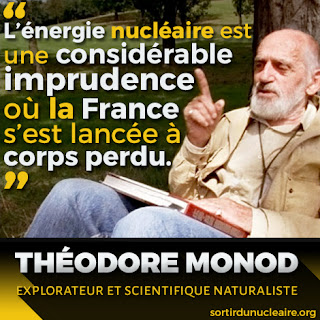Théodore Monod: French civil
servant, explorer, scientist and naturalist who spoke out against nuclear
weapons and nuclear energy
From
the obituary for Theodore
Monod in The Telegraph, November
24, 2000:
…
Monod finally returned to Paris in 1965, to take up a chair of African
Ichthyology at the Musée d'histoire
naturelle. He did not confine himself to writing about fish, however… He
spoke out regularly against pollution, and took stands on many subjects
besides. In 1960, he was one of the 121 who signed a protest against the use of
torture by the French authorities in Algeria, even though at the time he was in
government employment and forbidden by law from co-operating with such
movements… Every August 6 from 1983 he went to Taverny, the command center of
French strategic services, and undertook a four-day-long fast in memory of
Hiroshima and Nagasaki… Frank in his views, he would readily agree to be
interviewed and to appear on television to take part in discussions. He styled
himself a humanist and a pacifist, declaring that he was "violently
non-violent… Monod's many books included Les déserts (1973), L'émeraude
des Garamantes: Souvenirs d'un saharien (1984) and Mémoires d'un Naturaliste Voyageur (1990)… He was awarded gold medals by the
Société de Géographique, the Royal
Geographical Society and the American Geographical Society. He won the Haile
Selassie Prize for African Research, and was appointed a Grand officier de la Légion
d'honneur. [1]
Although
I am a civil servant, I persist, right or wrong, in considering myself a free
man. Though I have sold a part of my intellect to the State, I haven’t rendered
unto it my heart or my soul… And in fact it is rendering a service unto Caesar
to look him straight in the eye and say no. That can lead him to reflect. After
all, Caesar too has a soul. [2]
-- Theodore Monod, Le dernier des explorateurs
“Nuclear energy was a
considerably imprudent venture that France jumped into with headlong abandon.”
(this segment is a translation of the article and book excerpt published by Sortir du Nucléaire)
When
he passed away in 2000, Theodore Monod had been recognized as one of the greatest French
explorers, scientists and naturalists. He was a specialist in desert
environments, author of many famous works, and he was a humanist and a
committed ecologist. In The Seeker of the Absolute (Le chercheur d’absolu) he wrote:
Nuclear
energy was a considerably imprudent venture that France jumped into with
headlong abandon. Other countries, more informed, reversed course: Switzerland,
Germany, Sweden, the United States…
France
possesses the greatest volume of nuclear discharges in Europe. It rots the
ecological fabric. Justice has ruled: the capital of these radioactive wastes
will be located in Digueville, in la Manche. The total is astronomical, close
to 70,000 tons of French wastes, not including those that will come from
abroad…
We
can fear another Chernobyl, anywhere, anytime. Information [about Chernobyl] was
falsified to the point that they said the radioactive cloud hadn’t crossed the
Rhine when it was understood that it had come down over France.
La
Hague has become Europe’s nuclear garbage can, but the television reassures us.
All is for the best, according to ANDRA (l’Agence
nationale de gestion des déchets radioactifs), which has determined where
the garbage will be stored. This organization is on a quest for an eternal
resting place for it, but it is difficult. They have to take account of seismic
fault lines, the movement of tectonic plates, and soil types from sandstone to
clay. Humans may have a short memory, but not the Earth. Radioactive wastes
will end up in geological formations that are supposedly “stable.” They will be
there for millions of years because the wastes are long-lived. Yet the earth is
in perpetual motion, at the surface and below. Good people who are short on
memory but long on ego will sleep peacefully on this earthly waste bin with its
promise of solidity. It matters little that the containers will eventually
leak, as the public has a limited concept of the future. Fifty or one hundred
years seems to be an immense span of time. For a scientist, this is a spec in
the hourglass of Time. I’m not a pessimist; I’m just clairvoyant. [3]
Notes
[1] Obituary :
Theodore
Monot, The Telegraph, November
24, 2000.
[2] Jean-Marie Pelt, Théodore Monot, « Le dernier
des explorateurs? » dans La Cannelle
et le panda (Fayard, 1999).
[3] Théodore Monod, Le
chercheur d’absolu (éditions du Cherche-Midi, 1997), p. 60-65.

No comments:
Post a Comment